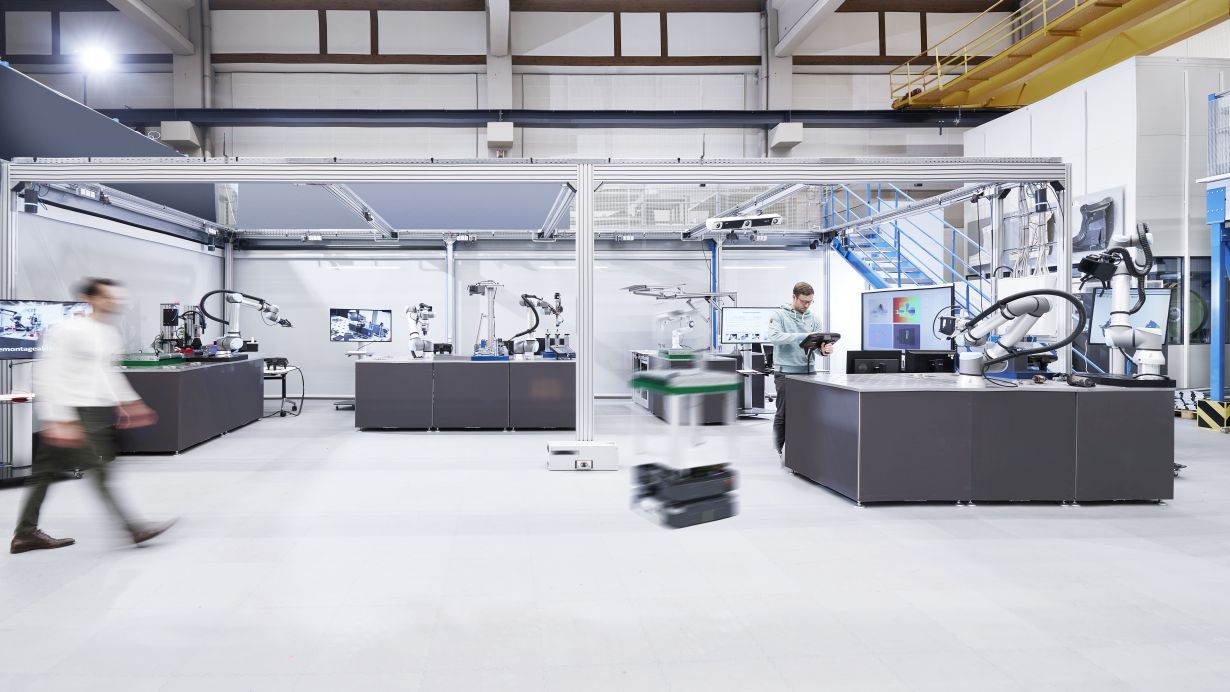How can factories autonomously adapt to constantly changing conditions? How can concrete be produced sustainably and with a minimum consumption of resources? How can we produce storage capacities for the extended use of renewable energy sources? Karlsruhe Institute of Technology (KIT) develops solutions for numerous challenges. Under the heading “Research for a Sustainable Future,” KIT will present latest findings at Hannover Messe’s Future Hub (hall 2, stand B35) and Energy Solutions (hall 13, stand C76) from April 22 to 26, 2024. In addition, KIT will be represented at the stand of Baden-Württemberg international, at other stands, and in the conference program.
For information on the stands and exhibits of KIT, click KIT’s digital press kit for Hannover Messe 2024
“A more sustainable industry not only is ecologically reasonable and necessary, it also pushes technology development for sustainable production processes, energy supply, and the automation of industrial processes in our country. KIT’s researchers are working across disciplines on the corresponding solutions. We are very happy to present some of them at this year’s Hannover Messe,” says Professor Oliver Kraft, Vice President Research and Acting President of KIT.
“At KIT, research and innovation go hand in hand. This close interaction and exchange with industry will be the key to a more sustainable industry. At some important points, rethinking is required. The mainly linear economy of the present must be replaced by circular economy in future. This is what we will present at Hannover Messe,” says Professor Thomas Hirth, KIT Vice President Transfer and International Affairs.
KIT at Future Hub (Hall 2, Stand B35)
At Future Hub (hall 2, stand B35), KIT and FZI Research Center for Information Technology, an innovation partner of KIT, will present their projects.
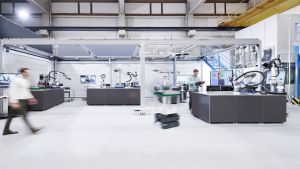
the AgiProbot factory.
(Photo: Amadeus Bramsiepe, KIT)
AgiProbot: Mobile Learning Robots with Multiple Sensors for an Agile Production System with Uncertain Product Specifications
The project is aimed at enabling factories to autonomously adapt to constantly changing conditions. Remanufacturing is considered an ideal application: Used products are disassembled, refurbished, and reassembled. In this way, their quality is enhanced to match that of new products, thus enabling reuse. Hence, remanufacturing contributes to a sustainable circular economy.
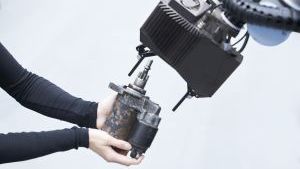
the demonstrator factory. The demonstrator
is divided into four different stations
dedicated to individual research questions.
(Photo: Amadeus Bramsiepe, KIT)
AgiProbot: Inspection of Used Products
Diagnosis and inspection serve to find out whether a used product can be refurbished and reused again. This initial inspection of used products is usually made by humans. AgiProbot uses a diagnosis station to automate this process. For this, various optical measurement methods are applied, including a robot-controlled camera system, as well as artificial intelligence methods. The station learns to autonomously detect the current state and potential defects.
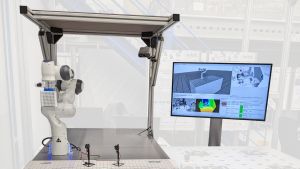
human disassembly processes.
(Foto: AgiProbot, KIT)
AgiProbot: Capture and Interpretation of Disassembly Processes
A separate station watches humans carrying out a manual disassembly. The sensors determine eye movements, human postures, and hand and arm movements in combination with tools and product components used. Moreover, single objects are captured on the working mat. These data are then input for robot programming by showing. The station will eventually disassemble the used product automatically.
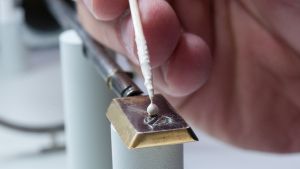
examination under a scanning electron microscope.
(Photo: ITC, KIT)
Net-zero Circular Concrete: Circular Economy for Concrete
Using an innovative circular process, concrete can be produced sustainably and with a minimum consumption of resources. For this, concrete waste from the demolition of buildings is crushed and sorted into coarse and fine fractions. Limestone is added to the fine fraction to produce a binder at moderate process temperatures. The coarse fraction absorbs the carbon dioxide (CO2) produced in the course of the process. Together with the binder, it is used for producing new concrete. The pilot plant that is being set up at KIT will be used to gain know-how for the production of larger quantities.
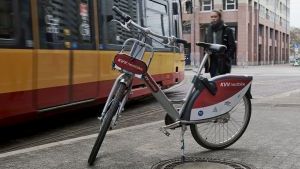
anonymization is a major topic.
(Photo: Amadeus Bramsiepe, KIT)
ANYMOS: Data Security in the Mobility Sector
Navigation systems and enabling purchases of tickets by mobile phone – these mobility services require data. How can these data be used to fulfil their purpose without permitting conclusions to be drawn about individual users? This challenge is the focus of the Competence Cluster on Anonymization for Networked Mobility Systems (ANYMOS) that will be presented jointly by KIT and FZI Research Center for Information Technology, an innovation partner of KIT. Researchers study the requirements and methods needed for the anonymization of data and assess circumstances under which anonymized data may be turned into personal data again. This will give rise to concrete applications, such as ticket systems that charge for the distance covered without revealing the passenger’s route.
Research to Business – Technology Offers of KIT
At the Future Hub stand, visitors may also obtain information on 40 innovations made by KIT that may be turned into marketable products and processes together with interested external cooperation partners.
KIT at Energy Solutions (Hall 13, Stand C76)
At Energy Solutions, the focus will be on energy storage systems that will be of crucial importance to the sustainable transformation of the energy sector and the extended use of renewable energy sources. KIT will present developments for various applications in power and heat supply and industry.
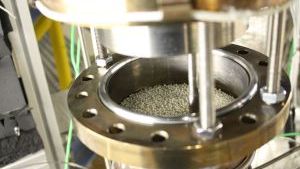
The photo shows the ceramic
beads that store the heat.
(Photo: KALLA, KIT)
Heat Transfer with Liquid Metals
Thermal energy storage systems can store energy in the form of heat as needed by industrial high-temperature processes in chemical or metal processing industries. Liquid metals enable heat storage at very high temperatures. They are combined with ceramic beads having a high storage density and long-term storage capacity. A pilot plant will demonstrate operation of a liquid metal-based heat storage system.
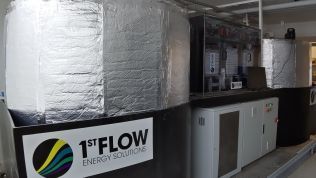
Within “BiFlow,“ the electrolyte tanks of the r
edox-flow battery are used to store heat.
(Foto: Daniela di Maio, KIT)
BiFlow: Hybrid Storage System for Power and Heat Supply
The energy transition and extended use of renewable energy sources require large storage capacities. The BiFlow project focuses on the development of a hybrid storage system that combines specific advantages of the lithium-ion battery with those of the redox-flow battery. The electrolyte tanks of the redox-flow battery are additionally used to store heat. A thermal coupling module increases the storage capacity and total efficiency of the system. This opens up new options for cost- and space-efficient storage of power and heat.
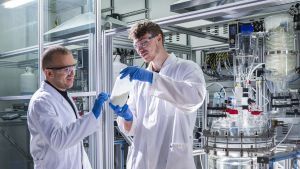
a bottle of Prussian White, an energy storage
material for for sodium-ion accumulators.
(Photo: Markus Breig, KIT)
Litona: Materials for Sustainable Sodium-ion Batteries
KIT’s startup Litona develops energy storage materials for sodium-ion batteries. Sodium-based batteries can be produced using abundant and inexpensive materials. This will reduce future costs of batteries and the dependence of Europe on imports of resources. Litona’s work presently concentrates on Prussian white analogs. These storage materials are of interest for stationary energy storage applications and for the e-mobility sector.
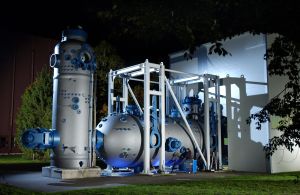
scientists study methods for hydrogen safety.
(Photo: KIT)
Safe Hydrogen Storage Systems
Hydrogen (H2) is a clean, efficient, and reliable energy carrier for many applications. KIT has more than 30 years of experience in H2 safety research. Its hydrogen test center HYKA accommodates worldwide unique infrastructures for experiments covering various release and combustion scenarios. The PET (partially vented explosion tube) is used to study turbulent combustion processes in hydrogen-air mixtures found in partially vented geometries. These may be leaky H2 storage tanks in rooms with doors and windows. Researchers also develop 3D simulation programs to specifically analyze and improve safety conditions.
Research to Business – Technology Offers of KIT
At the Energy Solutions stand, visitors may also obtain information on 32 innovations made by KIT that may be turned into marketable products and processes together with interested external cooperation partners.
KIT at Other Stands
At the stand of Baden-Württemberg international (hall 12, stand D15), the Innovation Campus “Future Mobility” (ICM) of Stuttgart University and KIT will provide insight into cutting-edge research for sustainable and digitalized production and mobility. ICM’s hydrogen world presents exhibits and projects of the fuel cell process chain. The RoboCable robot uses artificial intelligence to automatically lay cables and cable bundles. DeVee, a light electric vehicle demonstrator, presents subsystems of a future vehicle concept.
The Center for Electrochemical Energy Storage Ulm & Karlsruhe (CELEST) will also be present at the stand of Baden-Württemberg international (hall 12, stand D15). KIT, Ulm University, and the Center for Solar Energy and Hydrogen Research Baden-Württemberg (ZSW) cooperate in CELEST, the biggest platform for electrochemical storage systems in Germany.
At the stand of the Federal Ministry of Education and Research (hall 2, stand A28), the AppLHy! exhibit highlights the design and implementation of a combined transport route for liquid hydrogen and electric power. Power will be transmitted with the help of high-temperature superconductors.
The KIT Founders‘ Forge will be presenting itself together with nine spin-offs from KIT in the Startup Area in the Network Park (Hall 2, Stand D30). Two start-ups per trade fair day will be at the stand for talks and will also pitch on the Industrial Startup Stage. The KIT Founders' Forge is one of the largest university start-up centers in Germany and sees itself as an accelerator for innovative business ideas relating to the central future topics of our time.
KIT’s Contributions to the Conference Program
Tech Transfer Conference Stage (Hall 2, Stand B02)
Tuesday, April 23, 2024, 13.55 hrs: Panel Discussion: Welche Verantwortung trägt Forschung für eine nachhaltige Zukunft? (which responsibility does research have for a sustainable future?). In German with live interpretation. Experts of information technology, mobility, and research transfer will discuss the role and responsibility of science in the context of climate change, resource scarcity, and impacts on society. The focus will be on the very rapidly developing use of artificial intelligence. The participants in the discussion will be: Ada Streb, FZI Research Center for Information Technology, Head of the Capital Office of FZI and Head of the Department of Innovation, Strategy, and Transfer; Dr. Alexander Viehl, FZI, Head of the Department of Intelligent Systems and Production Engineering; Dr. Sandra Kauffmann-Weiß, KIT, Managing Director of the Innovation Campus Future Mobility; and Dr. Walter Tromm, Spokesman of the KIT Energy Center. The discussion will be presented by Dr. Wolfgang Breh, Managing Director of the KIT Energy Center.
Tuesday, April 23 2024, 14.50 hrs: Presentation in English with live interpretation: Net-zero Circular Concrete by Dr. Peter Stemmermann, Institute for Technical Chemistry of KIT.
Wednesday, April 24, 2024, 10.25 hrs: Presentation in German with live interpretation: Collaborative Research Center 1574 – The Circular Factory for the Eternal Product by Manuel Zaremski, Institute for Human and Industrial Engineering of KIT
ENERGY 4.0 Academy (Hall 12, Stand D35/26)
Tuesday, April 23, 2024, 14.20 hrs: Presentation in German (without live interpretation): Neues thermisches Kopplungssystem für stationäre elektrische Energiespeicher im Gebäudesektor (new thermal coupling system for stationary electrical energy storage systems in the building sector) by Dr. Christian Kupper, Institute of Electrical Engineering of KIT
Thursday, April 25, 2024, 10.00 hrs: Presentation in German: Methane pyrolysis as a key element for emission-free hydrogen and carbon production by Prof. Dr.-Ing. Thomas Wetzel, Institute of Thermal Process Engineering of KIT
Further Information:
lookKIT research magazine: Resources. Cycles. Energy
Highlight Topic: Energy Storage: Hope in Hot Temperatures: Researchers of KIT are working on heat storage at extremely high temperatures with the help of liquid metal
Digital Press Kit of KIT for Hannover Messe 2024
In close partnership with society, KIT develops solutions for urgent challenges – from climate change, energy transition and sustainable use of natural resources to artificial intelligence, sovereignty and an aging population. As The University in the Helmholtz Association, KIT unites scientific excellence from insight to application-driven research under one roof – and is thus in a unique position to drive this transformation. As a University of Excellence, KIT offers its more than 10,000 employees and 22,800 students outstanding opportunities to shape a sustainable and resilient future. KIT – Science for Impact.

